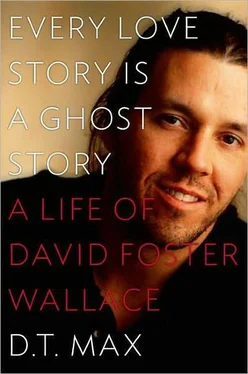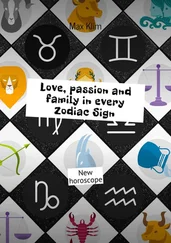And now he was far clearer on why we were all so hooked. It was not TV as a medium that had rendered us addicts, powerful though it was. It was, far more dangerously, an attitude toward life that TV had learned from fiction, especially from postmodern fiction, and then had reinforced among its viewers, and that attitude was irony. Irony, as Wallace defined it, was not in and of itself bad. Indeed, irony was the traditional stance of the weak against the strong; there was power in implying what was too dangerous to say. Postmodern fiction’s original ironists — writers like Pynchon and sometimes Barth — were telling important truths that could only be told obliquely, he felt. But irony got dangerous when it became a habit. Wallace quoted Lewis Hyde, whose pamphlet on John Berryman and alcohol he had read in his early months at Granada House: “Irony has only emergency use. Carried over time, it is the voice of the trapped who have come to enjoy the cage.” Then he continued:
This is because irony, entertaining as it is, serves an almost exclusively negative function. It’s critical and destructive, a ground-clearing….[I]rony’s singularly unuseful when it comes to constructing anything to replace the hypocrisies it debunks.
That was it exactly — irony was defeatist, timid, the telltale of a generation too afraid to say what it meant, and so in danger of forgetting it had anything to say. For Wallace, perhaps irony’s most frightening implication was that it was user-neutral: with viewers everywhere conditioned by media to expect it, anyone could employ it to any end. What really upset him was when Burger King used irony to sell hamburgers, or Joe Isuzu, cars. 14
What was really behind this objection, which gathered strength with the years? The stance was a nearly complete turnaround for a young writer who had made his identity as a clown and then a parodist and whose gifts as a “weird kind of forger” hardly depended on clarity of intent. Suddenly, in his eyes, sincerity was a virtue and saying what you meant a calling. Nostalgia seemed to play a part, as well as discontent with the person he had grown up to be, the two intertwined. Wallace was signaling that cultural health lay in a return to the earnestness he’d grown up with. Back then in his midwestern boyhood, a person said what he or she meant. It did not matter that he had never really been that person nor that his mental health issues had walled him off from ever becoming that person; it was reassuring for him to imagine it.
This led Wallace to conjure — easy enough since he was simultaneously already working on it — a new kind of fiction that might one day displace the Leyners of the world:
The next real literary “rebels” in this country might well emerge as some weird bunch of “anti-rebels,” born oglers who dare somehow to back away from ironic watching, who have the childish gall actually to endorse single-entrendre principles. Who treat of plain old untrendy human troubles and emotions in U.S. life with reverence and conviction. Who eschew self-consciousness and hip fatigue.
He continued:
The old postmodern insurgents risked the gasp and squeal: shock, disgust, outrage, censorship, accusations of socialism, anarchism, nihilism. The new rebels might be the ones willing to risk the yawn, the rolled eyes, the cool smile, the nudged ribs, the parody of gifted ironists, the “how banal .”
Wallace knew whose thinking had influenced his own. He sent Franzen a draft of the piece, “mostly just to see what you think about all the anti-irony stuff. You’ll see I’ve adopted a Franzenian view of Leyner, too.” And he dedicated the article to M. M. Karr, his other fount of sincerity. Crucially, Wallace was confident that his malaise was not just a personal issue but a societal condition. He sensed that there were others like himself. He mentioned to an interviewer after the publication of Infinite Jest that it was in Boston that he had
decided that maybe being really sad, and really sort of directionless, wasn’t just that I was fucked up. Maybe it was, maybe I was, maybe it was interesting in a way…. I just had so many friends who went through terrible times exactly when I did. In so many various different ways. And so many of them seemed to have so much going for ’em…. We’re talking lawyers, stockbrokers, young promising academics, poets.
His new commitment to single-entendre writing, writing that meant what it said, brought with it a surge in confidence that Wallace hadn’t felt in years, not since his 1987 visit to Yaddo. Not even his breakdown in November could stop it. And Karr’s departure for Syracuse didn’t hinder it: in fact it may even have been the spur for it, leaving Wallace with the need to prove he deserved her love. At any rate, he later wrote about the following year in the margin of a book, “The key to ’92 is that MMK was most important; IJ was just a means to her end (as it were).” “The writing is going surprisingly well,” he wrote Karr, probably in the spring of that year. “I’m scared, and physically I write very slowly, rather like a small child. It’s a long thing I want to do, and I’d started it before, so right now I divide my time between writing new stuff, which is a little disjointed…and looking back through two Hammermill boxes worth of notebooks and notecards and incredibly pretty laser print from my computer, which is now with Mark.”
He had been eyeing his old drafts for a long time without knowing what to make of them. He hadn’t known what the right or wrong track was because he didn’t know where he was going. That explained his fitful efforts since Yaddo. He told Karr, “I’d remembered the old stuff, a couple years old, as being just awful, but it turns out it isn’t; it just doesn’t go much of anywhere and is way too concerned with presenting itself as witty arty writing instead of effecting any kind of emotional communication with people. I feel like I have changed, learned so much about what good writing ought to be.”

There is no clear start date for Infinite Jest . Pieces of the novel date back to 1986, when Wallace may have written them originally as stand-alone stories. 15The work contains all three of Wallace’s literary styles, beginning with the playful, comic voice of his Amherst years, passing through his infatuation with postmodernism at Arizona, and ending with the conversion to single-entendre principles of his days in Boston. These three approaches correspond roughly to the three main plot strands of the book: the first, the portrait of the witty, dysfunctional Incandenza family; the second, the near-future dystopian backdrop of the book, in which the United States has united with Canada and Mexico to form the Organization of North American Nations (“O.N.A.N.,” its symbol an eagle crowned by a sombrero, maple leaf in claw), spawning a Quebecois separatist movement; and the third, the passion of Don Gately, set in the thinly fictionalized version of Granada House. Some parts of the book had already been with Wallace for five years by the breakthrough of 1991–92. In the fall of 1986, in Arizona, for instance, Gale Walden noticed a draft of some pages with her sister Joelle’s name under Wallace’s bed. She asked what he was working on and Wallace said it was fiction about a terrorist organization in Canada. “At which point,” she remembers, “my eyes glazed over and I didn’t ask any more.” This is at least the beginning of the dialogue between the two secret agents, Marathe, of Québec, and Steeply, of the U.S., which takes place on a mountain not unlike the ones Walden and Wallace liked to hike outside of Tucson, where the desert had, as Wallace writes in Infinite Jest , “the appearance of [a] mirage…. The sun of A.M. had no radial knives of light. It appeared brutal and businesslike and harmful to look upon.” 16
Читать дальше













